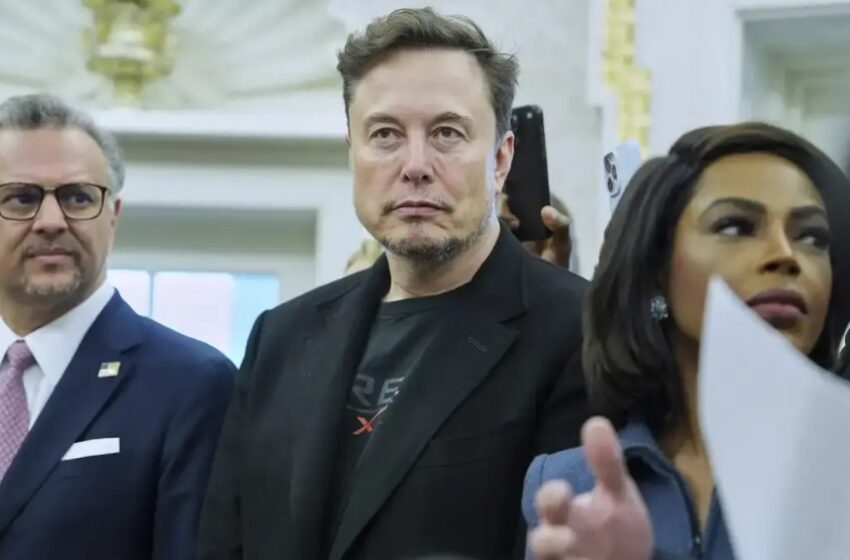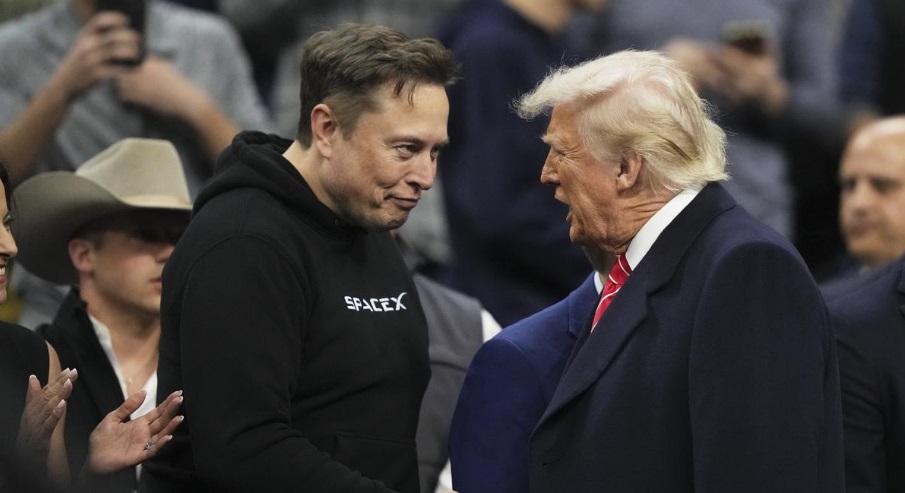
Elon Musk exits Trump administration following criticism of President’s ‘big, beautiful bill’
Elon Musk is stepping away from his work with the government to focus more on Tesla and SpaceX. He also said “I think I’ve done enough”
Elon Musk is leaving his role as a top adviser to President Donald Trump after helping lead efforts to cut down and change how the government works.
He posted on Wednesday (May 28, 2025) about his decision on X, his social media website.
“As my scheduled time as a Special Government Employee comes to an end, I would like to thank President @realDonaldTrump for the opportunity to reduce wasteful spending,” he wrote. “The @DOGE mission will only strengthen over time as it becomes a way of life throughout the government.”
A White House official, who requested anonymity to talk about the change, confirmed that Mr Musk was leaving.
Mr Musk’s departure comes one day after he criticised the centrepiece of Mr Trump’s legislative agenda, saying he was “disappointed” by what the President calls his “big beautiful bill”.
The new law includes tax cuts and stricter immigration rules. While talking to CBS, Mr. Musk called it a ‘massive spending bill’ that adds to the national debt and goes against the goals of his government efficiency team, called DOGE.
“I think a bill can be big or it could be beautiful,” Mr Musk said. “But I don’t know if it could be both.”
His interview with CBS aired on Tuesday night, May 27, 2025. On Wednesday, May 28, 2025, President Trump spoke from the Oval Office and defended his plans, saying the politics behind the bill were complicated.
“I’m not happy about certain aspects of it, but I’m thrilled by other aspects of it,” he said.
Mr Trump also suggested that more changes could be made.
“We’re going to see what happens,” he said. “It’s got a way to go.”
Republicans recently passed the bill in the House and are now discussing it in the Senate.
Mr Musk’s concerns are shared by some Republican lawmakers. “I sympathize with Elon being discouraged,” said Wisconsin Sen. Ron Johnson.
Speaking at a Milwaukee Press Club event on Wednesday, May 28, 2025, Mr. Johnson said he was “pretty confident” that enough people were against the bill to delay it until the president and leaders took spending cuts seriously. He also said that no matter how much pressure President Trump puts on him, he won’t change his mind.
Speaker Mike Johnson has asked senators to make as few changes to the legislation as possible, saying that House Republicans reached a “very delicate balance” that could be upended with major changes. The narrowly divided House will have to vote again on final passage once the Senate alters the bill.
On Wednesday (May 28, 2025), Mr Johnson thanked Mr Musk for his work and promised to pursue more spending cuts in the future, saying “the House is eager and ready to act on DOGE’s findings.”

The White House is sending some proposed rescissions, a mechanism used to cancel previously authorised spending, to Capitol Hill to solidify some of DOGE’s cuts. A spokesperson for the Office of Management and Budget said the package will include $1.1 billion from the Corporation of Public Broadcasting, which funds NPR and PBS, and $8.3 billion in foreign assistance.
Mr Musk’s criticism come as he steps back from his government work, rededicating himself to companies like the electric automaker Tesla and rocket manufacturer SpaceX. He’s also said he’ll reduce his political spending, because “I think I’ve done enough.”
Sometimes, he seems a bit disappointed by his time working in government. Even though he hoped DOGE would save $1 trillion by cutting spending, it hasn’t come close to that goal.
“The federal bureaucracy situation is much worse than I realised,” he told The Washington Post. “I thought there were problems, but it sure is an uphill battle trying to improve things in D.C., to say the least.”
Mr. Musk was excited about the chance to change things in Washington. He wore campaign hats at the White House, held his own rallies, and talked about too much government spending as a big problem. He also often spoke very positively about Mr. Trump.
“The more I’ve gotten to know President Trump, the more I like the guy,” Mr Musk said in February. “Frankly, I love him.”
Mr Trump repaid the favour, describing Mr Musk as “a truly great American.” When Tesla faced declining sales, he turned the White House driveway into a makeshift showroom to illustrate his support.
It’s unclear what, if any, impact that Mr Musk’s comments about the bill would have on the legislative debate. During the transition period, he helped whip up opposition to a spending measure as the country stood on the brink of a federal government shutdown.
His latest criticism could embolden Republicans who want bigger spending cuts. Republican Utah Sen. Mike Lee reposted a Fox News story about Mr Musk’s interview while also adding his own take on the measure, saying there was “still time to fix it.”
“The Senate version will be more aggressive,” Mr Lee said. “It can, it must, and it will be. Or it won’t pass.”
Only two Republicans — Reps. Warren Davidson of Ohio and Thomas Massie of Kentucky — voted against the bill when the House took up the measure last week.
Mr Davidson took note of Mr Musk’s comments on social media.
“Hopefully, the Senate will succeed with the Big Beautiful Bill where the House missed the moment,” he wrote. “Don’t hope someone else will cut deficits someday, know it has been done this Congress.”
The Congressional Budget Office, in a preliminary estimate, said the tax provisions would increase federal deficits by $3.8 trillion over the decade, while the changes to Medicaid, food stamps and other services would reduce spending by slightly more than $1 trillion over the same period.
House Republican leaders say the bill could pay for itself or even reduce the deficit if the economy grows faster. But outside groups don’t believe that. One group, the Committee for a Responsible Federal Budget, thinks the bill will add $3 trillion to the debt, including interest, over the next 10 years.


